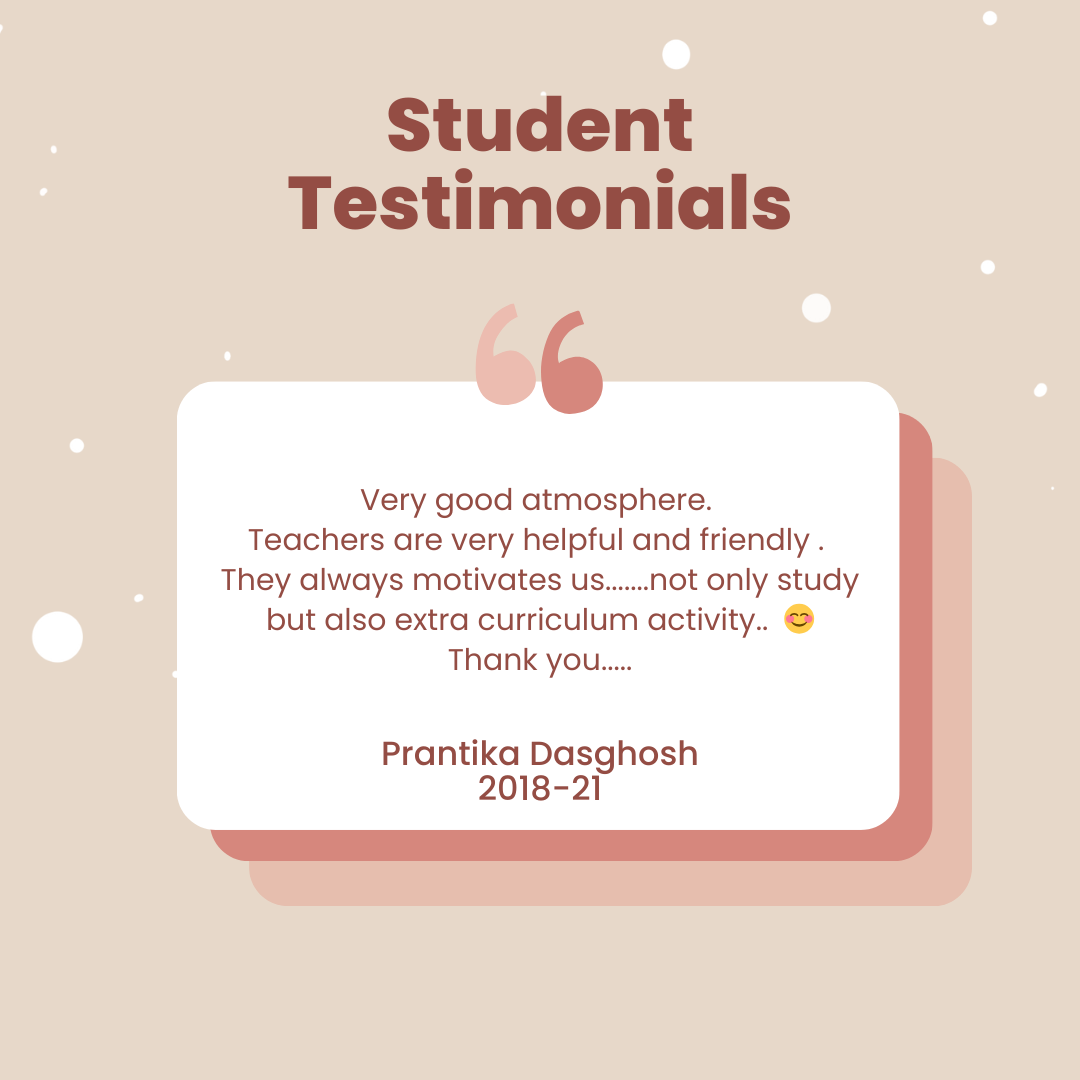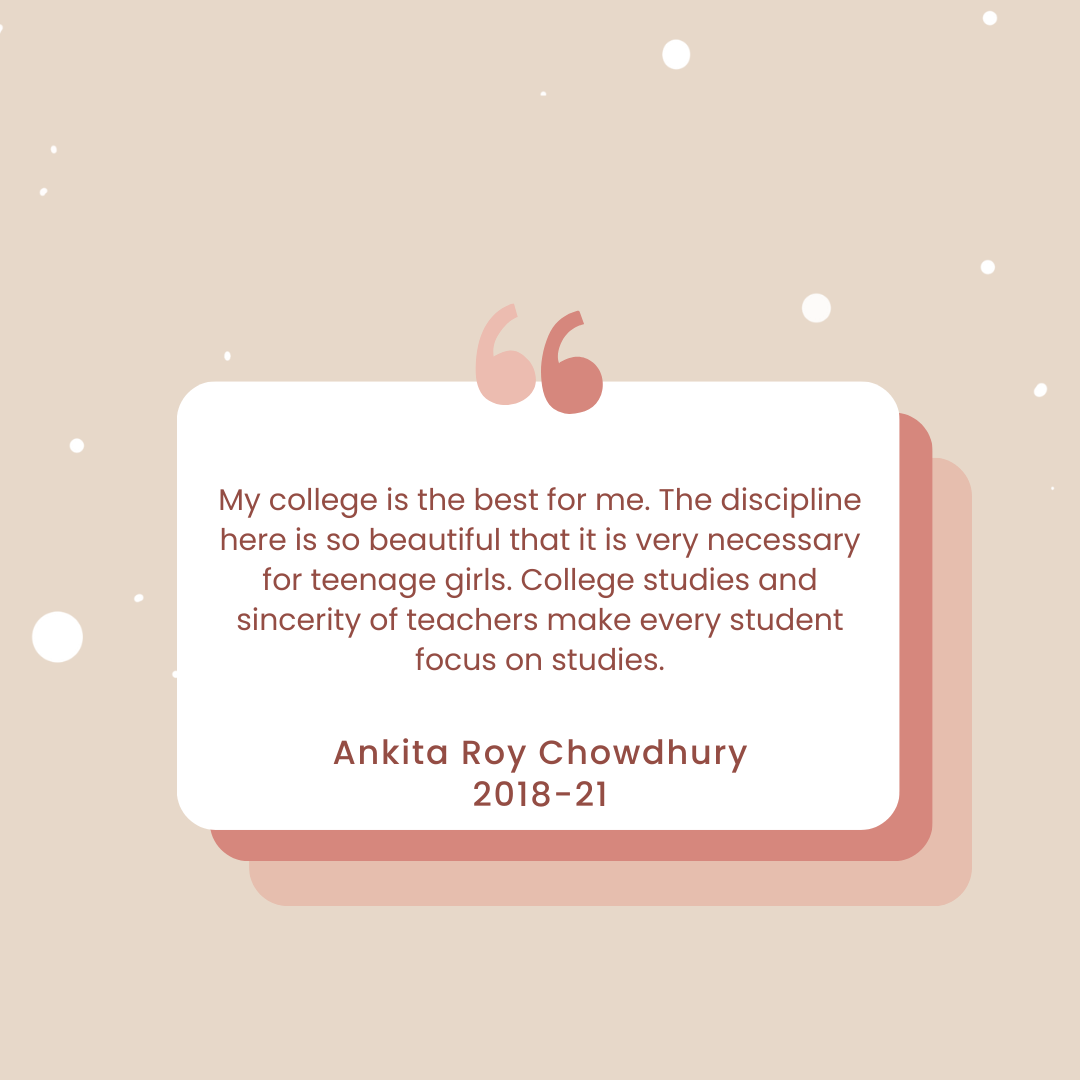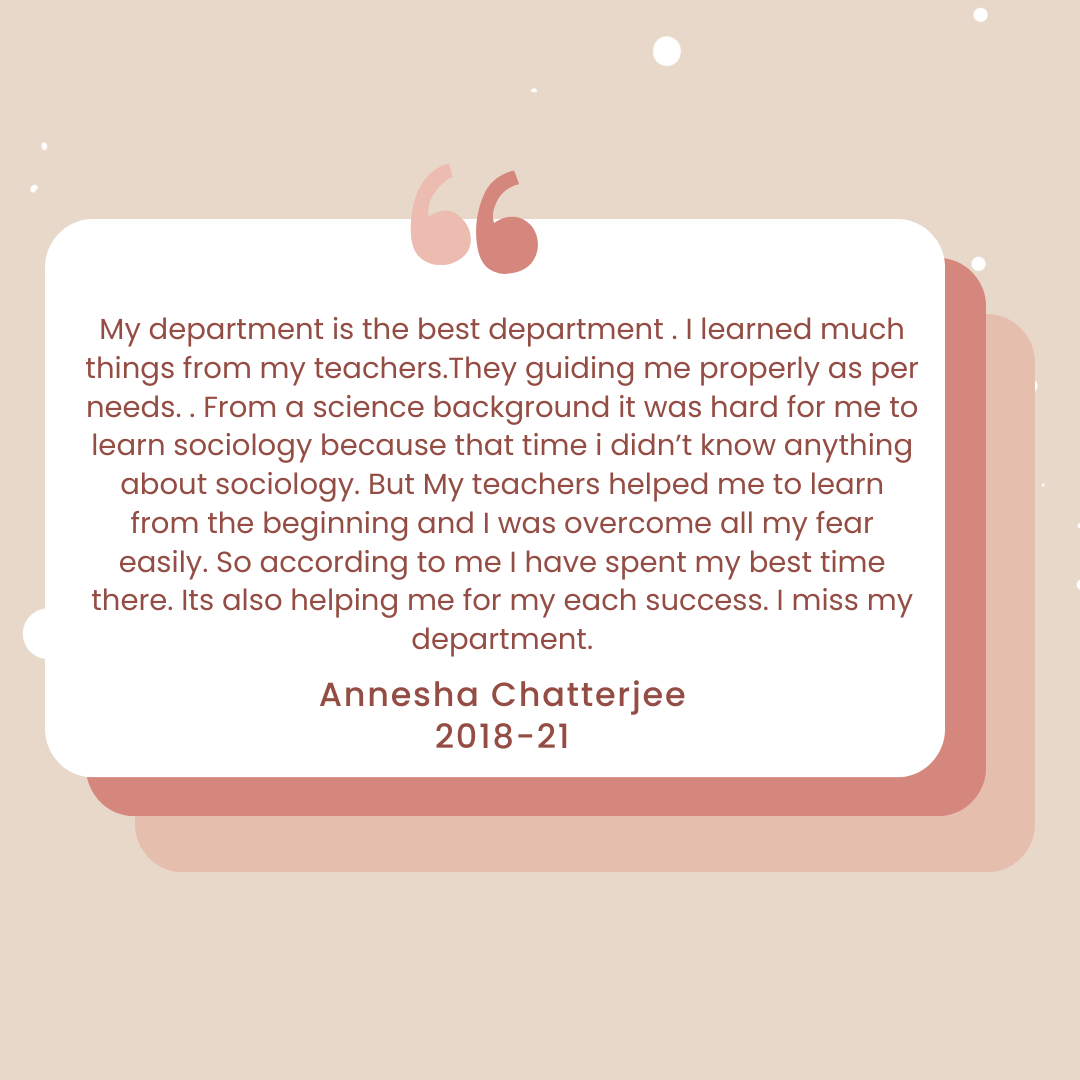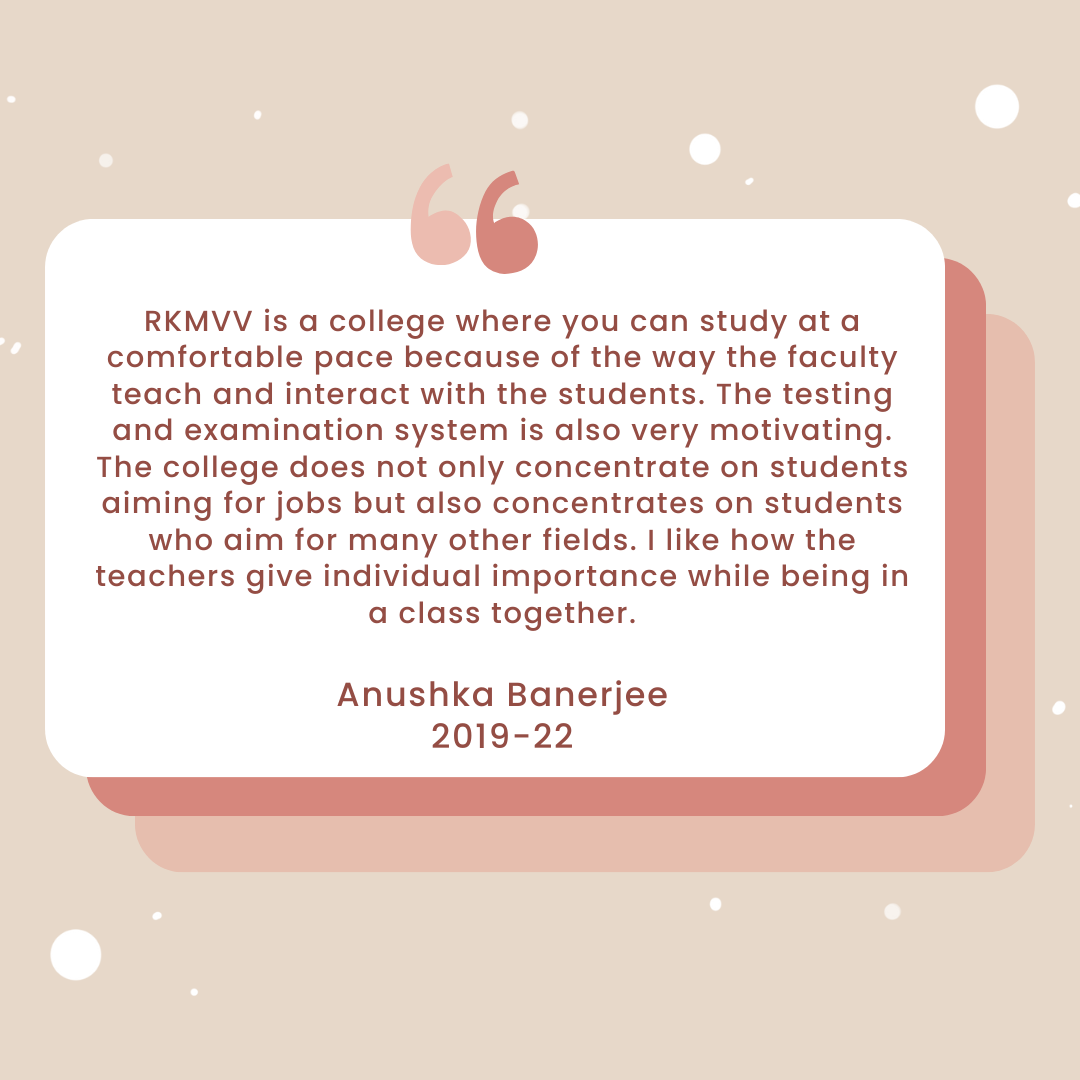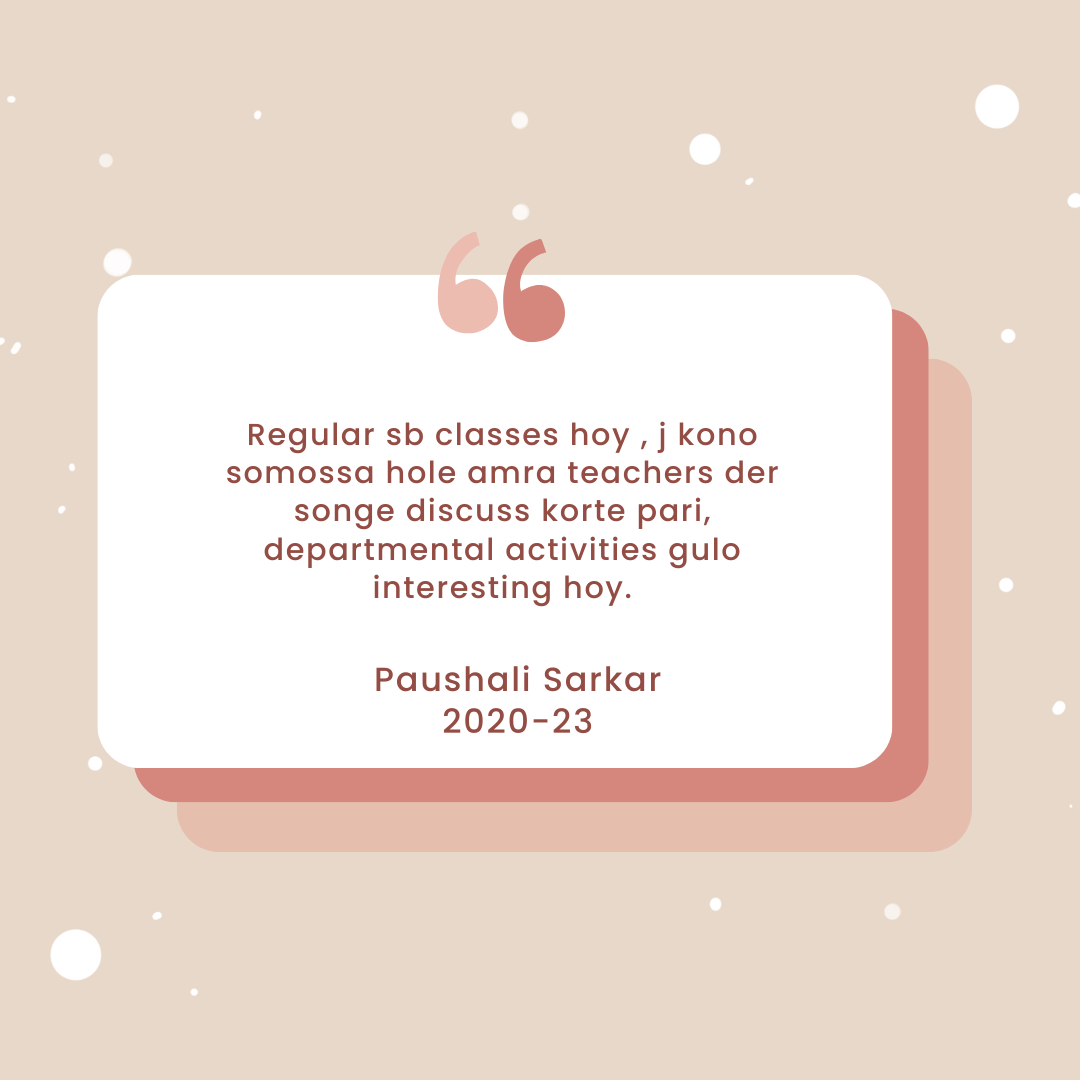
Initiation and brief overview
The Department of Sociology started in 2003 and has been operating as an Honours Department since 2008. From its inception, the Department has a good academic record with a high pass percentage for all its outgoing batches. The Department has also consistently produced University rank holders. At present, the Department has a four-member faculty- 2 Assistant Professors and 2 State Aided College Teachers (SACT I) with different specializations who teach various papers of the discipline.
Vision and outlook
The Department strives to inculcate a strong sociological sense among students with a specific focus on developing their analytical and writing abilities. At the same time, it focuses on introducing students to empirical field-based research which is central to Sociology as a discipline. The Department further ensures that students are well prepared academically and otherwise to chart their career paths in future while applying the skills they have picked up in the three years at this Department.
Methods of Teaching
The Department believes in a comprehensive approach towards teaching keeping in mind the nature and scope of Sociology as a discipline. Apart from the usual lecture method, the Department uses audio-visual aid, such as power point presentations and films to stimulate the learning process and to ensure that students develop a keen and critical sociological sense. The Department also encourages a field-based approach towards Sociology and regularly organizes educational and field trips to expose students to sociological processes and changes in society around them. Projects both individual and group-based also form an integral part of the evaluative scheme for students. Regular assessments through class-tests and written assignments ensure that students are well prepared for their final end-semester examinations.
Email: sociology@rksmvv.ac.in
Department of Sociology
Programme Outcomes (NEP)
PO1: Communication Skills: Confident to speak, write, read, listen and understand the English language and one or more Indian languages. Relate the ideas, knowledge, books, and people. Think and decide rationally, and adopt technology and electronic/print media in disseminating thoughts, facts and realities.
PO2: Social responsibility: Develop an obligation to act for the benefit of society at large. Cultivate the responsibility to maintain a balance between the economy and the ecosystems. Nurture a moral obligation to minimise the adverse effect on those immediately around them.
PO3: Critical, logical and rational thinking: Acquire the ability for objective, rational, sceptical, logical, and unbiased analysis of factual evidence to form a judgment or conclusion. Enhance the process of rational thinking, problem-solving and analytical evaluation from different perspectives.
PO4: Enlightened and Effective Citizenship: Cultivate progressive citizenship for a knowledge society for peace and prosperity of nations and the world. Develop clear, rational and progressive thinking. Participate in decision-making concerning the society and upholding national development, integrity, unity and fraternity.
PO5: Values and Ethics: Recognize the importance, worth and usefulness of principles and standards of behaviour and moral dimensions of one’s decisions and judgements. Be aware of various aspects of social responsibility through social, outreach, and cultural activities during the programme. Shape a personality which understands and appreciates religious and cultural diversity and plurality.
PO6: Sustainable development: Understand, organise and promote the principle of human development goals by sustaining the ability of natural systems, natural resources and ecosystem services upon which the economy and society depend.
PO7: Life-long process of Learning: Cultivate the proficiency to engage in independent, life-long and progressive learning abilities in the broadest context of changing socio-political-economic-cultural and technological scenarios.
PO8: Employment Skills: Be prepared for employment in various fields by developing reading, writing and comprehension skills which make the students fit and eligible for jobs in the government and non-government sectors. A broad spectrum study of various subjects helps the students compete in various examinations for employment after graduation.
Programme Specific Outcome
PSO 1: Help students develop a critical sociological imagination and differentiate between social institutions which form the framework of any society and understand the social worlds they live in.
PSO 2: To observe, explore and process the diversity of Indian society and formulate research to critically understand them.
PSO 3: Students will be able to identify, understand and differentiate between social institutions which form the framework of any society.
PSO 4: To formulate a hypothesis, measure variables and test, verify and validate sociological theory by applying research methods.
PSO 5: Students will be able to gain an understanding of some of the classical contributions in Sociology, and their contemporary relevance
PSO 6: It enables students to understand various social problems that prevail in the Indian society
PSO 7: Students develop the knowledge, skills and attitude necessary to be an engaged member of the community
PSO 8: Students will process analytical skills in areas such as policy analysis, administration analysis and problem-solving.
PSO 9: It helps to understand the concepts of social welfare and development and therefore helps to bring about positive social change.
PSO 10: Students will be able to do field-based research.
Course Outcome
| Paper | Course Outcome |
| DS1
Introducing Sociology |
Introduces students to the discipline enabling them to understand and recognize the relationship of Sociology to the other social sciences. Students will identify and define the basic concepts in Sociology. They will analyze and interpret these concepts, apply their understanding to various social contexts, and evaluate the impact of these concepts on societal dynamics. |
| DS2
Introducing Indian Society |
Introduces students to the major concepts in Indian Sociology, such as Caste, Village, Family, and Tribe, enabling them to understand and recognise these foundational elements. Students will identify and define these key concepts and analyse their roles within the societal structure of India. They will evaluate and interpret the impact of these concepts on Indian society, apply their knowledge to various sociological contexts, and create critical perspectives to study and examine societal dynamics in India. |
| DS3
Introducing Sociological Theory |
Introduces students to the multiplicity of the sociological perspective and acquaints them with the main theoretical orientations in Sociology, such as Functionalism, Conflict Perspective, Symbolic Interactionism and Feminism. This allows students to develop their own understandings and standpoints from which to grasp social situations that they encounter. |
PSO Mapping and Bloom’s Taxonomy
| Sl No. | Course Outcome | Knowledge level Bloom’s Taxonomy | PSOs mapping |
|
|
Introduces students to the discipline enabling them to understand and recognize the relationship of Sociology to the other social sciences. Students will identify and define the basic concepts in Sociology. They will analyze and interpret these concepts, apply their understanding to various social contexts, and evaluate the impact of these concepts on societal dynamics. | Understand, recognize, analyze, interpret, apply, create
|
1,3,4,7 |
|
|
Introduces students to the major concepts in Indian Sociology, such as Caste, Village, Family, and Tribe, enabling them to understand and recognize these foundational elements. Students will identify and define these key concepts and analyze their roles within the societal structure of India. They will evaluate and interpret the impact of these concepts on Indian society, apply their knowledge to various sociological contexts, and create critical perspectives to study and examine societal dynamics in India. | understand, recognize, identify, define, analyze, examine
|
1,2,3,4,6,9 |
| 3. | Introduces students to the multiplicity of the sociological perspective and acquaints them with the main theoretical orientations in Sociology, such as Functionalism, Conflict Perspective, Symbolic Interactionism and Feminism. This allows students to develop their own understandings and standpoints from which to grasp social situations that they encounter. | understand, examine, identify, analyze | 1,3,4,6,9 |
PO and CO matrix
| Sl. No. | CO | PO1 | PO2 | PO3 | PO4 | PO5 | PO6 | PO7 | PO8 |
| 1. | DS1 | ✔ | ✔ | ✔ | |||||
| 2. | DS2 | ✔ | ✔ | ✔ | ✔ | ||||
| 3. | DS3 | ● | ✔ | ✔ |
PO1: Communication Skills: Confident to speak, write, read, listen and understand the English language and one or more Indian languages. Relate the ideas, knowledge, books, and people. Think and decide rationally, and adopt technology and electronic/print media in disseminating thoughts, facts and realities.
PO2: Social responsibility: Develop an obligation to act for the benefit of society at large. Cultivate the responsibility to maintain a balance between the economy and the ecosystems. Nurture a moral obligation to minimize the adverse effect on those immediately around them.
PO3: Critical, logical and rational thinking: Acquire the ability for objective, rational, sceptical, logical, and unbiased analysis of factual evidence to form a judgment or conclusion. Enhance the process of rational thinking, problem-solving and analytical evaluation from different perspectives.
PO4: Enlightened and Effective Citizenship: Cultivate progressive citizenship for a knowledge society for the peace and prosperity of nations and the world. Develop clear, rational and progressive thinking. Participate in decision-making concerning the society and upholding national development, integrity, unity and fraternity.
PO5: Values and Ethics: Recognize the importance, worth and usefulness of principles and standards of behaviour and moral dimensions of one’s own decisions and judgements. Be aware of various aspects of social responsibility through social, outreach, and cultural activities during the programme. Shape a personality which understands and appreciates religious and cultural diversity and plurality.
PO6: Sustainable development: Understand, organize and promote the principle of human development goals by sustaining the ability of natural systems, natural resources and ecosystem services upon which the economy and society depend.
PO7: Life-long process of Learning: Cultivate the proficiency to engage in independent, life-long and progressive learning abilities in the broadest context of changing socio-political-economic-cultural and technological scenarios.
PO8: Employment Skills: Be prepared for employment in various fields by developing reading, writing and comprehension skills which make the students fit and eligible for jobs in the government and non-government sectors. A broad spectrum study of various subjects helps the students compete in various examinations for employment after graduation.
Programme Specific Outcome
PSO 1: Help students develop a critical sociological imagination and understand, articulate, and apply sociological theory to understand the social worlds they live in.
PSO 2: To observe, explore and process the diversity of Indian society and formulate research to critically understand them.
PSO 3: Students will be able to identify, understand and differentiate between social institutions which form the framework of any society.
PSO 4: To formulate a hypothesis, measure variables and test, verify and validate sociological theory by applying research methods.
PSO 5: Students will be able to gain an understanding of some of the classical contributions in Sociology, and their contemporary relevance
PSO 6: It enables students to understand various social problems that prevail in the Indian society
PSO 7: Students develop the knowledge, skills and attitude necessary to be an engaged member of the community
PSO 8: Students will process analytical skills in areas such as policy analysis, administration analysis and problem-solving.
PSO 9: It helps to understand the concepts of social welfare and development and therefore helps to bring about positive social change.
PSO 10: Students will be able to do field-based research.
Course Outcome
| Paper | Course Outcome |
| CC1
Introduction to Sociology I (SOCACOR01T) |
With this introductory paper, students will come to understand sociology as a discipline and have a firm foundation on all the basic concepts and their relationship with other disciples. |
| CC2
Sociology of India I (SOCACOR02T) |
In this paper, students will learn about the major discourses related to India and will be better in understanding the Indian society and its various cultural institutions. |
| CC3
Introduction to Sociology II (SOCACOR03T) |
Through this paper, students are introduced to sociological theory and will increase their sociological knowledge as they come to look at society through the four major perspectives of functionalism, interpretive perspective, conflict and feminist perspective. |
| CC4
Sociology of India II
|
This paper enhances the knowledge of students on Indian society as they learn about the various movements of resistance, mobilisation, change and about its state and society. The students are also introduced to the various thinkers who contributed to Indian Sociology. |
| CC5
Political Sociology (SOCACOR05T)
|
This course aims to help students understand the relationship between the state and society. It equips students to analyze the historical context of political processes, institutions, and changes, facilitating an understanding of the dynamic nature of political phenomena. By introducing various concepts such as political socialization, political culture, power, and elites, the course enables students to evaluate how major social factors affect political processes. |
| CC6
Sociology of Religion (SOCACOR06T)
|
Students will comprehend key concepts and identities of religion. They will apply sociological perspectives to the study of religion and spirituality using the sociological imagination. Students will analyze the impacts of religion on social class, power, race, gender, sexuality, and age. They will evaluate and critique the concepts of religion put forth by three thinkers: Marx, Weber, and Durkheim, and identify basic issues of religion. |
| CC7
Sociology of Gender (SOCACOR07T)
|
Students will understand gender as a social construct. They will examine the interplay between race, class, gender, sexuality, and other social groups. Students will recognize and assess gender discrimination and inequalities, as well as explore issues related to gender, power, and resistance.
|
| CC8
Economic Sociology (SOCACOR08T)
|
This course provides an understanding of the interrelation between the economy and society. Students will learn theoretical approaches to the economy, the market, and economic behaviour. By studying this course, students will gain knowledge of:
a) Forms of Exchange b) Systems of Production, Circulation, and Consumption. c) Contemporary Issues in Economic Sociology
|
| CC9
Sociology of Kinship (SOCACOR09T)
|
Students will gain deep knowledge of key terms and various approaches regarding kinship. They will comprehend concepts related to family, household, and marriage. This course will enable students to explore and reconceptualize ideas about re-casting kinship. |
| CC10
Social Stratification (SOCACOR10T) |
This course will introduce students to the basic concepts of sociological stratification. Students will learn the theoretical perspectives of social stratification and develop an in-depth understanding of stratification systems such as gender, caste, class, and ethnicity, along with the resulting social inequalities. They will analyze social mobility and changing power relations in the modern world. |
| CC11
Sociological Thinkers I (SOCACOR11T) |
The course aims to introduce students to sociological theory and thought. It offers students the chance to familiarize themselves with classical theories of Sociology. |
| CC12
Sociological Research Methods I (SOCACOR12T)
|
This course will aid students in grasping the fundamentals of sociological research and appreciating the importance of research design and formulation. Through this course, students will analyse:
a) The essence of Sociological Research b) Diverse perspectives on studying social phenomena c) Various modes of inquiry |
| CC13
Sociological Thinkers II (SOCACOR13T) |
The course familiarizes students with sociological theory. It recognizes Western contributions and analyzes the features of social theory. Additionally, it describes and illustrates the role of theory in building sociological knowledge. |
| CC14
Sociological Research Methods II (SOCACOR14T) |
The course introduces research methods. It emphasizes research design, data collection, and analysis. It teaches students the contours of quantitative and qualitative research. Additionally, it acquaints students with field data collection and dissertation writing. |
| DSE1
Urban Sociology (SOCADSE01T)
|
This course explains important perspectives in Urban Sociology and the Politics of Urban Space. It defines basic concepts of urban sociology, identifies the city with concepts of common consumption and social reproduction, and understands the nature, scope, and importance of urban sociology. |
| DSE2
Agrarian Sociology (SOCADSE02T) |
With this course, students will get complete knowledge about agrarian societies and agrarian studies, issues in agrarian sociology, themes in agrarian sociology of India and agrarian future. |
| DSE3
Environmental Sociology (SOCADSE03T) |
This course is designed to help students to understand the approaches to the environment and invite them to engage critically with the predominant theoretical approaches. It also introduces them to the key environmental debates in India and some of the more impactful environmental movements. |
| DSE4
Sociology of Work (SOCADSE04T)
|
The course engages students with work and industry. It facilitates understanding of basic concepts of work and industry and capitalistic notions in Sociology. It encourages the exploration of industrial culture and hazards. It will also help students to learn about the dimensions of work and work in the informal sector. |
| DSE5
Sociology of Health and Medicine (SOCADSE05T)
|
Sociology of health and medicine courses can help students develop skills to analyze health and illness from a sociological perspective. Students can learn to use sociological concepts to explain the social distribution of health, healthcare, and disease. Students can learn to communicate their sociological analysis of health and illness to non-sociological audiences. |
| DSE6
Indian Sociological Traditions (SOCADSE06T) |
The course facilitates in-depth knowledge about eminent Indian sociologists. It introduces the Contributions of Select Indian Sociologists and Social Thinkers. It enhances sociological understanding of Indian society and explains how sociologists in India engage with tradition, modernity, caste, tribe, and gender. It acquaints students with continuities and contradictions in Indian society.
|
PSO Mapping and Bloom’s Taxonomy
| Sl. No. | Course Outcome | Bloom’s Taxonomy | PSO Mapping
|
| 1. | CC1
With this introductory paper, students will come to understand sociology as a discipline and have a firm foundation on all the basic concepts and its relationship with other disciples |
know, understand, comprehend, integrate |
1,3,4,7 |
| 2. | CC2
In this paper, students will learn about the major discourses related to India and will be better in understanding the Indian society and its various cultural institutions. |
Learn, understand, trace |
1,2,3,4,6,9 |
| 3. | CC3
Through this paper students are introduced with sociological theory and will increase their sociological knowledge as they come to look at society through the four major perspectives of functionalism, interpretive perspective, conflict and feminist perspective |
Know, study, explain, handle |
1,3,4,5,7 |
| 4. | CC4
This paper enhances the knowledge of students on Indian society as they learn about the various movements of resistance, mobilisation, change and about its state and society. The students are also introduced to the various thinkers who contributed to Indian Sociology. |
Learn, understand, assess, compare |
1,2,3,4,6,9 |
| 5. | CC5
This course aims to help students understand the relationship between the state and society. It equips students to analyze the historical context of political processes, institutions, and changes, facilitating an understanding of the dynamic nature of political phenomena. By introducing various concepts such as political socialization, political culture, power, and elites, the course enables students to evaluate how major social factors affect political processes.
|
Understand, equip, analyse, facilitate, interpret, apply |
1,2,3,4,6,8 |
| 6. | CC6
Students will comprehend key concepts and identities of religion. They will apply sociological perspectives to the study of religion and spirituality using the sociological imagination. Students will analyse the impacts of religion on social class, power, race, gender, sexuality, and age. They will evaluate and critique the concepts of religion put forth by three thinkers: Marx, Weber, and Durkheim, and identify basic issues of religion.
|
Comprehend, handle, outline, trace, apply, analyse |
1,3,4,5,6,9 |
| 7. | CC7
Students will understand gender as a social construct. They will examine the interplay between race, class, gender, sexuality, and other social groups. Students will recognize and assess gender discrimination and inequalities, as well as explore issues related to gender, power, and resistance.
|
Know, recognize, trace, compare, incorporate, explain |
1,2,3,4,5,6,7,9 |
| 8. | CC8
This course provides an understanding of the interrelation between the economy and society. Students will learn theoretical approaches to the economy, the market, and economic behavior. By studying this course, students will gain knowledge of: a) Forms of Exchange b) Systems of Production, Circulation, and Consumption. c) Contemporary Issues in Economic Sociology |
Understand, analyse, apply, grasp, incorporate |
1,2,3,4,6,8 |
| 9. | CC9
Students will gain deep knowledge of key terms and various approaches regarding kinship. They will comprehend concepts related to family, household, and marriage. This course will enable students to explore and reconceptualize ideas about re-casting kinship. |
Know, classify, critique, assess, detail |
1,2,3,4,7 |
| 10. | CC10
This course will introduce students to the basic concepts of sociological stratification. Students will learn the theoretical perspectives of social stratification and develop an in-depth understanding of stratification systems such as gender, caste, class, and ethnicity, along with the resulting social inequalities. They will analyze social mobility and changing power relations in the modern world. |
Example, reproduce, characterize, explain |
1,2,3,4,5,8 |
| 11. | CC11
The course aims to introduce students to sociological theory and thought. It offers students the chance to familiarize themselves with classical theories of Sociology. |
Know, handle, generalise, analyse, apply |
1,3,4,5,7 |
| 12. | CC12
This course will aid students in grasping the fundamentals of sociological research and appreciating the importance of research design and formulation. Through this course, students will analyze: a) The essence of Sociological Research b) Diverse perspectives on studying social phenomena c) Various modes of inquiry |
Know, test, validate, verify, apply, design incorporate, compare, confirm. | 1,3,4,7,10 |
| 13. | CC13
The course familiarizes students with sociological theory. It recognizes Western contributions and analyzes the features of social theory. Additionally, it describes and illustrates the role of theory in building sociological knowledge. |
Know, analyse, criticize, generalise, apply |
1,3,4,5,7 |
| 14. | CC14
The course introduces research methods. It emphasizes research design, data collection, and analysis. It teaches students about quantitative and qualitative research. Additionally, it acquaints students with field data collection and dissertation writing. |
Know, test, validate, verify, apply, combine, compare, confirm, design. |
1,3,4,7,10 |
| 15. | DSE1
The course engages students with work and industry. It facilitates understanding of basic concepts of work and industry and capitalistic notions in Sociology. It encourages exploration of industrial culture and hazards. It will also help students to learn about the dimensions of work and work in the informal sector. |
Facilitate, understand, determine, assess |
1,2,3,4,6,7,9 |
| 16. | DSE2
With this course students will get complete knowledge about agrarian societies and agrarian studies, issues in agrarian sociology, themes in agrarian sociology of India and agrarian future |
Know, generalize, depict, explain |
1,2,3,4,8,9 |
| 17. | DSE 3
This course is designed to help students to understand the approaches to the environment and invite them to engage critically with the predominant theoretical approaches. It also introduces them to the key environmental debates in India and some of the more impactful environmental movements. |
Know, generalize, depict, explain, understand |
1,3,8,9 |
| 17. | DSE4
The course engages students with work and industry. It facilitates understanding of basic concepts of work and industry and capitalistic notions in Sociology. It encourages exploration of industrial culture and hazards. It will also help students to learn about the dimensions of work and work in the informal sector. |
Judge, interpret, contrast, explain, compare |
1,2,3,4,6,7,8,9 |
| 18. | DSE 5
Sociology of health and medicine courses can help students develop skills to analyze health and illness from a sociological perspective. Students can learn to use sociological concepts to explain the social distribution of health, healthcare, and disease. Students can learn to communicate their sociological analysis of health and illness to non-sociological audiences. |
learn, engage, interpret, explain |
1,3,8,9 |
| 19. | DSE6
The course facilitates in-depth knowledge about eminent Indian sociologists. It introduces the Contributions of Select Indian Sociologists and Social Thinkers. It enhances sociological understanding of Indian society. Analyzes how sociologists in India engage with tradition, modernity, caste, tribe, and gender. It acquaints students with continuities and contradictions in Indian society.
|
Defend, critique, interpret, evaluate | 1,2,3,4,5 |
PO and CO matrix
| Sl. No. | CO | PO1 | PO2 | PO3 | PO4 | PO5 | PO6 | PO7 | PO8 | |
| 1. | CC1 | ✔ | ✔ | ✔ | ||||||
| 2. | CC2 | ✔ | ✔ | ✔ | ✔ | |||||
| 3. | CC3 | ✔ | ✔ | ✔ | ||||||
| 4. | CC4 | ✔ | ✔ | ✔ | ✔ | ✔ | ✔ | |||
| 5. | CC5 | ✔ | ✔ | ✔ | ✔ | |||||
| 6. | CC6 | ✔ | ✔ | ✔ | ||||||
| 7. | CC7 | ✔ | ✔ | ✔ | ||||||
| 8. | CC8 | ✔ | ✔ | ✔ | ✔ | |||||
| 9. | CC9 | ✔ | ✔ | ✔ | ✔ | |||||
| 10. | CC10 | ✔ | ✔ | ✔ | ✔ | |||||
| 11. | CC11 | ✔ | ✔ | |||||||
| 12. | CC12 | ✔ | ✔ | ✔ | ✔ | ✔ | ||||
| 13. | CC13 | ✔ | ✔ | |||||||
| 14. | CC14 | ✔ | ✔ | ✔ | ✔ | ✔ | ||||
| 15. | DSE1 | ✔ | ✔ | ✔ | ✔ | |||||
| 16. | DSE2 | ✔ | ✔ | ✔ | ||||||
| 17. | DSE3 | ✔ | ✔ | ✔ | ✔ | |||||
| 18. | DSE4 | ✔ | ✔ | |||||||
Programme Outcomes (CBCS)
PO1: Communication Skills: Confident to speak, write, read, listen and understand the English language and one or more Indian languages. Relate the ideas, knowledge, books, and people. Think and decide rationally, and adopt technology and electronic/print media in disseminating thoughts, facts and realities.
PO2: Social responsibility: Develop an obligation to act for the benefit of society at large. Cultivate the responsibility to maintain a balance between the economy and the ecosystems. Nurture a moral obligation to minimize the adverse effect on those immediately around them.
PO3: Critical, logical and rational thinking: Acquire the ability for objective, rational, sceptical, logical, and unbiased analysis of factual evidence to form a judgment or conclusion. Enhance the process of rational thinking, problem-solving and analytical evaluation from different perspectives.
PO4: Enlightened and Effective Citizenship: Cultivate progressive citizenship for a knowledge society for the peace and prosperity of nations and the world. Develop clear, rational and progressive thinking. Participate in decision-making concerning the society and upholding national development, integrity, unity and fraternity.
PO5: Values and Ethics: Recognize the importance, worth and usefulness of principles and standards of behaviour and moral dimensions of one’s own decisions and judgements. Be aware of various aspects of social responsibility through social, outreach, and cultural activities during the programme. Shape a personality which understands and appreciates religious and cultural diversity and plurality.
PO6: Sustainable development: Understand, organize and promote the principle of human development goals by sustaining the ability of natural systems, natural resources and ecosystem services upon which the economy and society depend.
PO7: Life-long process of Learning: Cultivate the proficiency to engage in independent, life-long and progressive learning abilities in the broadest context of changing socio-political-economic-cultural and technological scenarios.
PO8: Employment Skills: Be prepared for employment in various fields by developing reading, writing and comprehension skills which make the students fit and eligible for jobs in the government and non-government sectors. A broad spectrum study of various subjects helps the students compete in various examinations for employment after graduation.
Programme Specific Outcome
PSO 1: Help students develop a critical sociological imagination and understand, articulate, and apply sociological theory to understand the social worlds they live in.
PSO 2: To observe, explore and process the diversity of Indian society and formulate research to critically understand them.
PSO 3: Students will be able to identify, understand and differentiate between social institutions which form the framework of any society.
PSO 4: To formulate a hypothesis, measure variables and test, verify and validate sociological theory by applying research methods.
PSO 5: Students will be able to gain an understanding of some of the classical contributions in Sociology, and their contemporary relevance
PSO 6: It enables students to understand various social problems that prevail in the Indian society
PSO 7: Students develop the knowledge, skills and attitude necessary to be an engaged member of the community
PSO 8: Students will process analytical skills in areas such as policy analysis, administration analysis and problem-solving.
PSO 9: It helps to understand the concepts of social welfare and development and therefore helps to bring about positive social change.
PSO 10: Students will be able to do field-based research.
Course Outcome
| Paper | Course Outcome | ||
| CC1
Introduction to Sociology I (SOCACOR01T) |
|
||
| CC2
Sociology of India I (SOCACOR02T) |
In this paper, students will learn about the major discourses related to India and will be better in understanding the Indian society and its various cultural institutions. | ||
| CC3
Introduction to Sociology II (SOCACOR03T) |
Through this paper, students are introduced to sociological theory and will increase their sociological knowledge as they come to look at society through the four major perspectives of functionalism, interpretive perspective, conflict and feminist perspective. | ||
| CC4
Sociology of India II
|
This paper enhances the knowledge of students on Indian society as they learn about the various movements of resistance, mobilisation, change and about its state and society. The students are also introduced to the various thinkers who contributed to Indian Sociology. | ||
| CC5
Political Sociology (SOCACOR05T)
|
This course aims to help students understand the relationship between the state and society. It equips students to analyze the historical context of political processes, institutions, and changes, facilitating an understanding of the dynamic nature of political phenomena. By introducing various concepts such as political socialization, political culture, power, and elites, the course enables students to evaluate how major social factors affect political processes. | ||
| CC6
Sociology of Religion (SOCACOR06T)
|
Students will comprehend key concepts and identities of religion. They will apply sociological perspectives to the study of religion and spirituality using the sociological imagination. Students will analyze the impacts of religion on social class, power, race, gender, sexuality, and age. They will evaluate and critique the concepts of religion put forth by three thinkers: Marx, Weber, and Durkheim, and identify basic issues of religion. | ||
| CC7
Sociology of Gender (SOCACOR07T)
|
Students will understand gender as a social construct. They will examine the interplay between race, class, gender, sexuality, and other social groups. Students will recognize and assess gender discrimination and inequalities, as well as explore issues related to gender, power, and resistance.
|
||
| CC8
Economic Sociology (SOCACOR08T)
|
This course provides an understanding of the interrelation between the economy and society. Students will learn theoretical approaches to the economy, the market, and economic behaviour. By studying this course, students will gain knowledge of:
a) Forms of Exchange b) Systems of Production, Circulation, and Consumption. c) Contemporary Issues in Economic Sociology
|
||
| CC9
Sociology of Kinship (SOCACOR09T)
|
Students will gain deep knowledge of key terms and various approaches regarding kinship. They will comprehend concepts related to family, household, and marriage. This course will enable students to explore and reconceptualize ideas about re-casting kinship. | ||
| CC10
Social Stratification (SOCACOR10T) |
This course will introduce students to the basic concepts of sociological stratification. Students will learn the theoretical perspectives of social stratification and develop an in-depth understanding of stratification systems such as gender, caste, class, and ethnicity, along with the resulting social inequalities. They will analyze social mobility and changing power relations in the modern world. | ||
| CC11
Sociological Thinkers I (SOCACOR11T) |
The course aims to introduce students to sociological theory and thought. It offers students the chance to familiarize themselves with classical theories of Sociology. | ||
| CC12
Sociological Research Methods I (SOCACOR12T)
|
This course will aid students in grasping the fundamentals of sociological research and appreciating the importance of research design and formulation. Through this course, students will analyse:
a) The essence of Sociological Research b) Diverse perspectives on studying social phenomena c) Various modes of inquiry |
||
| CC13
Sociological Thinkers II (SOCACOR13T) |
The course familiarizes students with sociological theory. It recognizes Western contributions and analyzes the features of social theory. Additionally, it describes and illustrates the role of theory in building sociological knowledge. | ||
| CC14
Sociological Research Methods II (SOCACOR14T) |
The course introduces research methods. It emphasizes research design, data collection, and analysis. It teaches students the contours of quantitative and qualitative research. Additionally, it acquaints students with field data collection and dissertation writing. | ||
| DSE1
Urban Sociology (SOCADSE01T)
|
This course explains important perspectives in Urban Sociology and the Politics of Urban Space. It defines basic concepts of urban sociology, identifies the city with concepts of common consumption and social reproduction, and understands the nature, scope, and importance of urban sociology. | ||
| DSE2
Agrarian Sociology (SOCADSE02T) |
With this course, students will get complete knowledge about agrarian societies and agrarian studies, issues in agrarian sociology, themes in agrarian sociology of India and agrarian future. | ||
| DSE3
Environmental Sociology (SOCADSE03T) |
This course is designed to help students to understand the approaches to the environment and invite them to engage critically with the predominant theoretical approaches. It also introduces them to the key environmental debates in India and some of the more impactful environmental movements. | ||
| DSE4
Sociology of Work (SOCADSE04T)
|
The course engages students with work and industry. It facilitates understanding of basic concepts of work and industry and capitalistic notions in Sociology. It encourages the exploration of industrial culture and hazards. It will also help students to learn about the dimensions of work and work in the informal sector. | ||
| DSE5
Sociology of Health and Medicine (SOCADSE05T)
|
Sociology of health and medicine courses can help students develop skills to analyze health and illness from a sociological perspective. Students can learn to use sociological concepts to explain the social distribution of health, healthcare, and disease. Students can learn to communicate their sociological analysis of health and illness to non-sociological audiences. | ||
| DSE6
Indian Sociological Traditions (SOCADSE06T) |
The course facilitates in-depth knowledge about eminent Indian sociologists. It introduces the Contributions of Select Indian Sociologists and Social Thinkers. It enhances sociological understanding of Indian society and explains how sociologists in India engage with tradition, modernity, caste, tribe, and gender. It acquaints students with continuities and contradictions in Indian society.
|
||
|
|
PSO Mapping and Bloom’s Taxonomy
| Sl. No. | Course Outcome | Bloom’s Taxonomy | PSO Mapping
|
|
| 1. | CC1
|
know, understand, comprehend, integrate |
1,3,4,7 | |
| 2. | CC2
In this paper students will learn about the major discourses related to India and will be better in understanding the Indian society and its various cultural institutions. |
Learn, understand, trace |
1,2,3,4,6,9 | |
| 3. | CC3
Through this paper students are introduced with sociological theory and will increase their sociological knowledge as they come to look at society through the four major perspectives of functionalism, interpretive perspective, conflict and feminist perspective |
Know, study, explain, handle |
1,3,4,5,7 | |
| 4. | CC4
This paper enhances the knowledge of students on Indian society as they learn about the various movements of resistance, mobilisation, change and about its state and society. The students are also introduced to the various thinkers who contributed to Indian Sociology. |
Learn, understand, assess, compare |
1,2,3,4,6,9 | |
| 5. | CC5
This course aims to help students understand the relationship between the state and society. It equips students to analyze the historical context of political processes, institutions, and changes, facilitating an understanding of the dynamic nature of political phenomena. By introducing various concepts such as political socialization, political culture, power, and elites, the course enables students to evaluate how major social factors affect political processes.
|
Understand, equip, analyse, facilitate, interpret, apply |
1,2,3,4,6,8 | |
| 6. | CC6
Students will comprehend key concepts and identities of religion. They will apply sociological perspectives to the study of religion and spirituality using the sociological imagination. Students will analyse the impacts of religion on social class, power, race, gender, sexuality, and age. They will evaluate and critique the concepts of religion put forth by three thinkers: Marx, Weber, and Durkheim, and identify basic issues of religion.
|
Comprehend, handle, outline, trace, apply, analyse |
1,3,4,5,6,9 | |
| 7. | CC7
Students will understand gender as a social construct. They will examine the interplay between race, class, gender, sexuality, and other social groups. Students will recognize and assess gender discrimination and inequalities, as well as explore issues related to gender, power, and resistance.
|
Know, recognize, trace, compare, incorporate, explain |
1,2,3,4,5,6,7,9 | |
| 8. | CC8
This course provides an understanding of the interrelation between the economy and society. Students will learn theoretical approaches to the economy, the market, and economic behavior. By studying this course, students will gain knowledge of: a) Forms of Exchange b) Systems of Production, Circulation, and Consumption. c) Contemporary Issues in Economic Sociology |
Understand, analyse, apply, grasp, incorporate |
1,2,3,4,6,8 | |
| 9. | CC9
Students will gain deep knowledge of key terms and various approaches regarding kinship. They will comprehend concepts related to family, household, and marriage. This course will enable students to explore and reconceptualize ideas about re-casting kinship. |
Know, classify, critique, assess, detail |
1,2,3,4,7 | |
| 10. | CC10
This course will introduce students to the basic concepts of sociological stratification. Students will learn the theoretical perspectives of social stratification and develop an in-depth understanding of stratification systems such as gender, caste, class, and ethnicity, along with the resulting social inequalities. They will analyze social mobility and changing power relations in the modern world. |
Example, reproduce, characterize, explain |
1,2,3,4,5,8 | |
| 11. | CC11
The course aims to introduce students to sociological theory and thought. It offers students the chance to familiarize themselves with classical theories of Sociology. |
Know, handle, generalise, analyse, apply |
1,3,4,5,7 | |
| 12. | CC12
This course will aid students in grasping the fundamentals of sociological research and appreciating the importance of research design and formulation. Through this course, students will analyze: a) The essence of Sociological Research b) Diverse perspectives on studying social phenomena c) Various modes of inquiry |
Know, test, validate, verify, apply, design incorporate, compare, confirm. | 1,3,4,7,10 | |
| 13. | CC13
The course familiarizes students with sociological theory. It recognizes Western contributions and analyzes the features of social theory. Additionally, it describes and illustrates the role of theory in building sociological knowledge. |
Know, analyse, criticize, generalise, apply |
1,3,4,5,7 | |
| 14. | CC14
The course introduces research methods. It emphasizes research design, data collection, and analysis. It teaches students about quantitative and qualitative research. Additionally, it acquaints students with field data collection and dissertation writing. |
Know, test, validate, verify, apply, combine, compare, confirm, design. |
1,3,4,7,10 | |
| 15. | DSE1
The course engages students with work and industry. It facilitates understanding of basic concepts of work and industry and capitalistic notions in Sociology. It encourages exploration of industrial culture and hazards. It will also help students to learn about the dimensions of work and work in the informal sector. |
Facilitate, understand, determine, assess |
1,2,3,4,6,7,9 | |
| 16. | DSE2
With this course students will get complete knowledge about agrarian societies and agrarian studies, issues in agrarian sociology, themes in agrarian sociology of India and agrarian future |
Know, generalize, depict, explain |
1,2,3,4,8,9 | |
| 17. | DSE 3
This course is designed to help students to understand the approaches to the environment and invite them to engage critically with the predominant theoretical approaches. It also introduces them to the key environmental debates in India and some of the more impactful environmental movements. |
Know, generalize, depict, explain, understand |
1,3,8,9 |
|
| 17. | DSE4
The course engages students with work and industry. It facilitates understanding of basic concepts of work and industry and capitalistic notions in Sociology. It encourages exploration of industrial culture and hazards. It will also help students to learn about the dimensions of work and work in the informal sector. |
Judge, interpret, contrast, explain, compare |
1,2,3,4,6,7,8,9 | |
| 18. | DSE 5
Sociology of health and medicine courses can help students develop skills to analyze health and illness from a sociological perspective. Students can learn to use sociological concepts to explain the social distribution of health, healthcare, and disease. Students can learn to communicate their sociological analysis of health and illness to non-sociological audiences. |
learn, engage, interpret, explain |
1,3,8,9 |
|
| 19. | DSE6
The course facilitates in-depth knowledge about eminent Indian sociologists. It introduces the Contributions of Select Indian Sociologists and Social Thinkers. It enhances sociological understanding of Indian society. Analyzes how sociologists in India engage with tradition, modernity, caste, tribe, and gender. It acquaints students with continuities and contradictions in Indian society.
|
Defend, critique, interpret, evaluate | 1,2,3,4,5 |
PO and CO matrix
| Sl. No. | CO | PO1 | PO2 | PO3 | PO4 | PO5 | PO6 | PO7 | PO8 | |
| 1. | CC1 | ✔ | ✔ | ✔ | ||||||
| 2. | CC2 | ✔ | ✔ | ✔ | ✔ | |||||
| 3. | CC3 | ✔ | ✔ | ✔ | ||||||
| 4. | CC4 | ✔ | ✔ | ✔ | ✔ | ✔ | ✔ | |||
| 5. | CC5 | ✔ | ✔ | ✔ | ✔ | |||||
| 6. | CC6 | ✔ | ✔ | ✔ | ||||||
| 7. | CC7 | ✔ | ✔ | ✔ | ||||||
| 8. | CC8 | ✔ | ✔ | ✔ | ✔ | |||||
| 9. | CC9 | ✔ | ✔ | ✔ | ✔ | |||||
| 10. | CC10 | ✔ | ✔ | ✔ | ✔ | |||||
| 11. | CC11 | ✔ | ✔ | |||||||
| 12. | CC12 | ✔ | ✔ | ✔ | ✔ | ✔ | ||||
| 13. | CC13 | ✔ | ✔ | |||||||
| 14. | CC14 | ✔ | ✔ | ✔ | ✔ | ✔ | ||||
| 15. | DSE1 | ✔ | ✔ | ✔ | ✔ | |||||
| 16. | DSE2 | ✔ | ✔ | ✔ | ||||||
| 17. | DSE3 | ✔ | ✔ | ✔ | ✔ | |||||
| 18. | DSE4 | ✔ | ✔ | |||||||
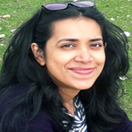
Assistant Professor
View Profile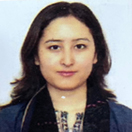
Assistant Professor
View Profile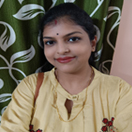
SACT- 1
View Profile
SACT-I
View Profile| Routine | Download |
| 2024-25 (ODD SEM) | View |
| 2023-24 (ODD SEM) | View |
| 2023-24 (EVEN SEM) | View |
| 2022-23 (ODD SEM) | View |
| 2022-23 (EVEN SEM) | View |
| 2021-22 (ODD SEM) | View |
| 2021-22 (EVEN SEM) | View |
| 2020-21 (ODD SEM) | View |
| 2020-21 (EVEN SEM) | View |
| 2019-20 (ODD SEM) | View |
| 2019-20 (EVEN SEM) | View |
| 2018-19 (ODD SEM) | View |
| 2018-19 (EVEN SEM) | View |
| Study Materials | Download |
| CC 10 BB Pierre Bourdieu: Stratification- Forms of Capital | View |
| CC9 UKM Filiation and Incest | View |
| CC7 UKM Gender Role and Gender Stereotyping | View |
| CC7 APC LGBTQ | View |
| CC8 BB Original Affluent Society- Hunting Gathering Society | View |
| CC7 UKM Sociology of Gender: Basic Concepts | View |
| DSE 1 AC: Urban Sociology Network Theory of Urban | View |
| CC1 AC Introduction to Sociology | View |
| CC11 BB Karl Marx: Historical Materialism | View |
| Major Sem 2 AC Agrarian Social Classes (NEP) | View |
| Major Sem 3 AC Conflict Theory: Lewis Coser (NEP) | View |
| Sociology Department Event Report | |||||
| Sl. No. | Nature of Events | Date | Title | Resource Person | No. of participants |
| 01. | SEMINAR | 6th December 2024 | Inter-departmental seminar on Women’s Rights and the Constitution of India | Smt. Ruchira Goswami, Assistant Professor in Sociology, West Bengal National University of Juridical Sciences | |
| 02. | STUDENT
ACTIVITY |
22nd May 2024 | Microteaching | Students from Sem 1, 4 and 6 | 20 |
| 03. | EXTENSION LECTURE | 19th April 2024 | Gender, Work and Institutional Structures: Experiences of Women in Research
|
Dr. Ananya Jana, Post Doctoral Fellow, McGill University, Canada | 18 |
| 04. | WORKSHOP | 4th April, 2024 | Screening of Onnucharito: Childhood Mental Health | Sourav Sarkar, Film Maker Fragrant Creations | 23 |
| 05. | SEMINAR | 5th March 2024 | Inter-departmental Seminar on Social Justice and Zero Discrimination | Dr. Basabi Chakraborty, the Senior Faculty, School of Social Sciences, Netaji Subhas Open University
2. Dr. Homprabha Barua the Assistant Professor of Human Rights at Vivekananda College, Kolkata |
75 |
| 06. | WORKSHOP | 30th November 2023 | Transgender Remembrance Day | Anurag Maitrayee, Trans Activities
|
67
|
| 07. | STUDENT ACTIVITY | 10th July 2023 | Farewell and freshers Party | SEM- I (13) SEM-II (5) SEM-III (2) | |
| 08. | SEMINARS | 28th June 2023 | Sappho for equality – Pride programme | Minakshi Sanyal, Koyel Ghosh, Madhurima Ghosh | 72
|
| 09. | EXTENSION LECTURES | 3rd Mar 2023 | ‘smile as a gesture’ | Debadadyuti Karmakar, Assistant Professor, Department of Sociology, Prasanta Chandra Mahalanobis Mahavidyalay | SEM- I (13) SEM-II (4) SEM-III (2) |
| 11. | EDUCATIONAL TOUR | 10th feb 2023 | Book fair visit | SEM- I (12) SEM-II (5) SEM-III (2) | |
| 12. | EDUCATIONAL TOUR | 17-Dec-22 | Departmental excursion | SEM- I (12) SEM-II (5) SEM-III (1) | |
| 13. | SEMINARS | 16th December 2022 | ‘Society and Health: Perspectives from Clinical Research’ | Bony Dasgupta, Clinical Research Coordinator, Tata Medical Centre, Kolkata | SEM- I (13) SEM-II (5) SEM-III (2) |
| 14. | PROJECTS | 9th December 2022 | Poster presentation on ‘Violence against women’ | SEM- I (13) SEM-II (5) SEM-III (2) | |
| 15. | PROJECTS | 30th November 2022 | Presentation on the film ‘The holy conspiracy | SEM-II (5) SEM-III (2) | |
| 16. | EDUCATIONAL TOUR | 23rd August 2022 | Students day out for movie ‘the holy conspiracy | SEM-II (5) SEM-III (2) | |
| 17. | EXTENSION LECTURES | 15th March 2022 | Perspectives of Indian Society | Dr. Aniruddha Chowdhury, Visiting faculty, WBSU | SEM- I (4) SEM-II (2) SEM-III (7) |
| 18. | EXTENSION LECTURES | 8th March 2022 | Research Methodology | Dr. Prarhita Biswas, Professor and Head of Department, School of Education, Adamas University
Dr. Mousami Guha, Jadavpur University, Department of Philosophy |
|
| 19. | PROJECTS | 10-Jun- 2021 | World Environment Day Celebration | SEM- I (2) SEM-II (7) SEM-III (6) | |
| 20. | PROJECTS | 28-May- 2021 | Presentation of film review | SEM- I (2) SEM-II (7) SEM-III (6) | |
| 21. | PROJECTS | 27-May- 2021 | Presentation of film review | SEM- I (2) SEM-II (7) SEM-III (6) | |
| 22. | PROJECTS | 8th Mar 2021 | women’s day Celebration | SEM- I (2) SEM-II (7) SEM-III (6) | |
| 23. | PROJECTS | 21st feb 2021 | International Mother language Day Celebration | SEM- I (2) SEM-II (7) SEM-III (6) | |
| 24. | PROJECTS | 5-Mar-21 | Film screening series : ‘Bhrahma janen gopon komoti’ | SEM- I (3) SEM-II (7) SEM-III (6) | |
| 25. | PROJECTS | 23-Feb-21 | Film screening series : Article 15 | SEM- I (3) SEM-II (7) SEM-III (6) | |
| 26. | PROJECTS | 12-Feb-21 | Film screening series: Samantaral | SEM- I (3) SEM-II (7) SEM-III (6) | |
| 27. | SEMINARS | 29th Jan 2021 | GRC Lecture series Sociology department | Dr. Maitree Chaudhury, Centre for Studies of Social Systems, JNU | SEM- I (3) SEM-II (7) SEM-III (6) |
| 28. | SEMINARS | 26th June 2020 | Space gender and the other in the context of our everyday life | Dr. Kamalini Mukherjee, Faculty, Department of Sociology, Bhawanipore Education Society College, Kolkata | SEM- I (3) SEM-II (7) SEM-III (6) |
| 29. | SEMINARS | 25th June 2020 | Challenges of the new normal: COVID-19 and disability in India | Dr. Kum Kum Sarkar, Assistant Professor, Department of Sociology, School of Social Sciences, Netaji Subhas Open University
|
SEM- I (3) SEM-II (7) SEM-III (6) |
| 30. | SEMINARS | 24th June 2020 | Challenges of the new normal of COVID-19 and experiences of women | Dr. Basabi Chakraborty, Founder Head and Senior Faculty, Department of Sociology, Rabindra Bharati University | SEM- I (3) SEM-II (7) SEM-III (6) |
Advanced and Slow Learners Policy
The Department of Sociology follows its policy of slow and advanced learners which it adopted from July 2021 to cater to students who may learn at a different pace or have advanced learning needs. These policies aim to ensure that all students receive an appropriate and effective education tailored to their individual abilities and needs.
Advanced learners
Advanced learners are the students who understand a taught topic relatively faster than the other students in the class and achieve high scores. They have more potential and talent than the others in the class. They have more potential with their answer writing skills, retention, memory, critical thinking ability, creativity and contextualization practice. They are also hard-working behaviours and are driven to do their best in their studies.
Slow learners
Slow learners on the other hand mostly find it difficult to understand the subject. They may fail in exams or will score only poor grades. However, the poor performance may not be a sign of poor capacity or talent but may be due to inappropriate teaching methods, socio-economic background, lack of motivation and support, unorganized learning practices or even the inability to converse in the language taught in class.
Identifying Slow and Advanced Learners
Slow learners
The slow learners in the classroom are identified on the basis of the following grounds:
Advanced Learners
The advanced learners in the classroom are identified on the basis of the following grounds:
Steps Taken for Slow Learners and Advanced Learners
After the identification of the learners, the department’s following policies are adopted:-
Slow Learners
Advanced Learners
Result of CBCS System
Sociology Department
| Year | Appeared | Passed | CGPA 6-7
60%-70% |
CGPA 7-8
70%-80% |
CGPA 8-9
80%-90% |
CGPA 10
Above 90% |
| 2024 | 5 | 3 | 2 | 1 | ||
| 2023 | 2 | 2 | – | 2 | – | – |
| 2022 | 7 | 7 | 1 | 4 | 2 | – |
| 2021 | 6 | 6 | 2 | 3 | 1 | – |
Annual Mode Results
| Year | Appeared | Passed | 1St class | University Ranks (1st to 10th) | |
| 2016 | H | 8 | 8 | 1 | 5 |
| 2017 | H | 6 | 5 | 1 | 2 |
| 2018 | H | 8 | 8 | – | 3 |
| 2019 | H | 5 | 4 (1 P) | – | 3 |
| 2020 | H | 7 | 6 | 5 | –
|
Student Placement
Sociology Department
| Year | Name of student placed and contact details | Name of the employer with contact details | Designation |
| 2018-19 | Rima Paul | ILEAD College, Kolkata | Employed as teaching faculty |
| Sonali Chowdhury | Web Tech Design LLP,
Kolkata |
Employed as a graphic designer | |
| 2019-20 | Dishari Saha | Sanjivani bank, Bolpur | Bank staff |
| Munmun Mukherjee | RKSMVV, Dum dum | Faculty of our college library | |
| 2021-22 | Annesha Chatterjee | TCS, Kolkata | BPS (Business Process Services) |
| 2022-23 | Jahnabi Das | TCS, Kolkata | BPS (Business Process Services) as an associate |
| Saptaparni Sarkar | TCS, Kolkata | BPS (Business Process Services ) as an associate | |
| 2023-24 | Paushali Sarkar | TCS, Kolkata | BPS (Business Process Services) |
| 2024-25 | Priyanka Sarkar | Tradebulls Securities (P) Limited | Business development Manager |
| Girija Mahanta | HDB Financial Services Limited | Senior Telecalling Officer |
Student’s Progression- Admitted to Higher Education
Sociology Department
| Year | Name of student enrolling into higher education | Name of institution joined | Name of programme admitted to | Course Duration (mention Year) |
| 2018-19 | Debanjana Bhattacharya | St.Xavier’s University | MA | 2 years |
| Archita Ghoshal | WBSU | MA | 2 years | |
| Rajrupa Ghosh | Rabindra Bharati University |
MA |
2 years | |
| Riya Banerjee | Rabindra Bharati University | MA | 2 years | |
| Debjani Gupta |
West Bengal State University |
MA |
2 years |
|
| 2019-20 | Soujita Pramanik | Rabindra Bharati University | MA |
2 years |
| Dishari Saha | Rabindra Bharati University |
MA |
2 years |
|
| Anuradha Paul | Rabindra Bharati University | MA | 2 years | |
| 2020-21 | Manasi Koley | Rabindra Bharati University | MA | 2 years |
| 2021-22 | Sanjukta Dey | New Delhi Institute Of Management | MBA | 2 years |
| Joyee Dutta | WBSU | MA | 2 years | |
| Alipa Maity | WBSU | MA | 2 years | |
| Ankita Roychowdhury | CU | MA | 2 years | |
| Prantika Das Ghosh |
Rabindra Bharati University |
MA |
2 years |
|
| 2022-23 | Priti Mondol | Calcutta University | MA | 2 years |
| 2023-24 | Umme Habiba Nasrin | Rabindra Bharati University | MA | 2 years |
| 2024-25 | Srimoyee Basu | Christ University | MA | 2 years |
Workshop on Understanding the Pride Movements: Diverse Expressions of the LGBTIQ Communities
Date: 28.06 2023
This jointly held Workshop organized by the Department of Sociology, History and Human Rights attempted at discussing the different nuances of the queer spectrum. It was held in June, the Internationally Acclaimed Pride Month. The Welcome Address, delivered by the Principal, emphasized human (gender-blind) differences at many levels/shades (sartorial, hair style, body) and she emphasised that we all are not identical. The Workshop from the very beginning wanted first to listen to the voices of the students and their takes on queers. It was followed by a thorough and sharply focused interaction on the Sex and Gender System among both faculty and students.

Farewell and freshers Party
Date: 10.07.2023
As part of the curriculum, the Department of Sociology organized a farewell and freshers party for Semester- VI and Semester- II students. All the departments had attended the programme and the day was filled with excitement, joy, music, enthusiasm, and happiness. Being part of the college, seniors and juniors make friends with each other to celebrate this day. Freshers along with their seniors got a chance to showcase their talent through various performances like solo dances, dual dances, group dances, recitations, songs and at the final hour small games were organized to make the function more artful and full of fun. Without the help of each student in our department, such an amazing event could not be successful.

Book Fair
Date: 10.02.2023
As part of the curriculum, a one-day educational book fair visit was organized by the Department of Sociology and this trip was meant to brighten the young minds and stimulate their way of thinking. Our destination was Milan Mela Ground at Karunamoyee, Salt Lake. Students took some pictures from the outer facades of the Mela. Then we went inside the book fair, which was decked up very well. Due to the international book fair, there were lots of foreign book stalls. Every year, the Kolkata Book Fair has a focal theme, on which the event is based. For this year the theme is Spain, where we tried to capture the culture & art scene of Spain. Then we had a break and enjoyed our lunch in a small stall. After that, we reached the middle of the mela ground, where the students strolled around, and clicked some panoramic shots of the Kolkata Book Fair. It was an excellent, informative and eventful day for all of us.
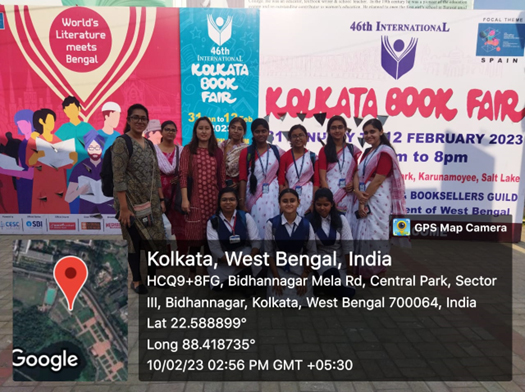
Departmental excursion
Date: 17.12.2022
As part of the curriculum, a one-day educational trip was organized by the Department of Sociology. This trip was meant to brighten the young minds and stimulate their way of thinking. Our first destination was St. Paul’s Cathedral; Photography was barred inside the premises, so the students took some shots of the outer facades. Then we moved on to the Nandan; it was decked up very well due to the international film festival, where we tried to capture the cinematic & aesthetic art scenes. Then we had a break and enjoyed our delicious lunch in an Indo-Chinese restaurant. After that we reached our final & last destination Maidan, where students strolled around and clicked some panoramic shots of the Victoria Memorial. It was an excellent, informative, eventful day for all of us.
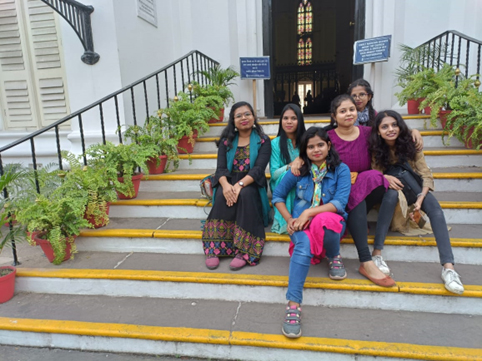
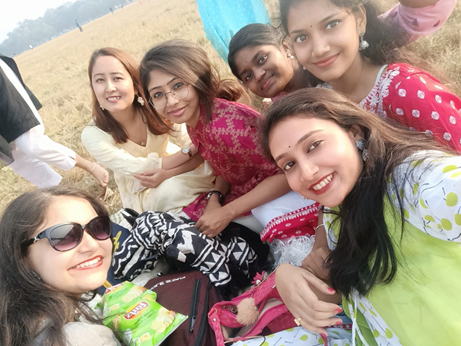
Name: Poster Presentation: Violence against women
Date: 09/12/2022
As part of the curriculum, the Department of Sociology organized a poster presentation for all the departmental students. They made a single poster on “Violence against women”. The event envisaged that empowering a woman was a way to defend not only violation against a specific gender but also it could raise the level of standard of the society.
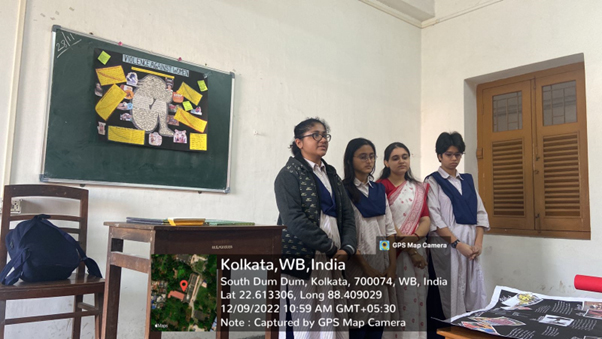

Digital Poster-Making Presentation on World Environment Day
Date: 15.06.2021
A poster presentation was done by the 2nd and 3rd-year students of Sociology. The students were required to make an original digital poster on World Environment Day on any topic related to the environment. They were also required to send a write-up on their poster within 100 words. This had to be submitted within 10.06.2021, and the poster presentation was held on the same where the students described their poster on 15.06.2021
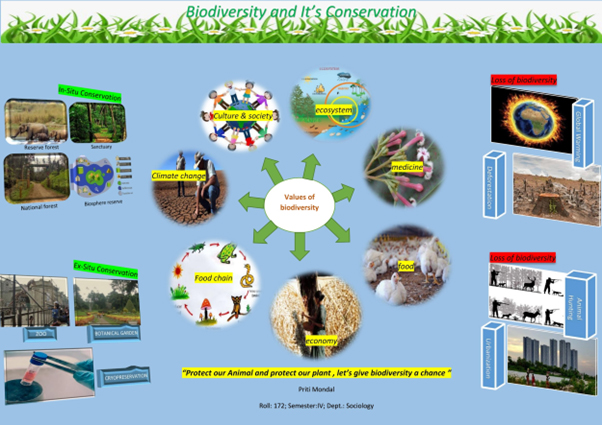
Student’s Presentation on the Film, ‘Holy Conspiracy’
Date: 30.11.2022
The students were taken out for the film titled, ‘Holy Conspiracy’ on 23.08.2022 to watch and review the film critically. The students were given a project to write their understanding on the film. Thereafter, on the basis of their film project, on 9th December 2022, the students gave their presentations and gave their critical film reviews. The students were able to see and explain the societal issues highlighted in the film. They were taught to watch the movie not only as entertainment but also to sharpen their critical thinking and explain the intention and moral behind the making of the movie which was to highlight the use of religion in politics.



Online film Review
Date: 27.05.21 and 28.05.21
The Department of Sociology organized two-day virtual film review session on the basis of 3 films: Samantaral, Article 15 and Brahma Janen Gopon Kommoti. All the students participated in this programme and they had analysed the film through their sociological perspective. In Article 15; they realized the real value of the article 15, i.e., “Prohibition of discrimination on grounds of religion, race, caste, sex or place of birth”. In Bhrahma janen gopon komoti; the students became aware about the irrational thought process of our society and in Samantaral, the students became aware about the loophole of our mindset. Through the screening of these film series students understood the socio-cultural and status of women in our society and the importance of the Indian constitution.



Our Achievers
University Rank Holders
| Sl no. | Year | Name | University Rank |
| 1 | 2023 | Paushali Sarkar | 4th (79.65%) |
| 2 | 2023 | Umme Habiba Nasrin | 6th (77.1%) |
| 3 | 2022 | Priti Mondal | 2nd (82.5%) |
| 4 | 2022 | Adrija Roy | 3rd (81.45%) |
| 5 | 2021 | Annesha Chatterjee | 1st (80.1%) |
| 6 | 2021 | Ankita Roychowdhury | 2nd (78.6%) |
| 7 | 2021 | Prantika Dasghosh | 6th (75.15%) |
| 8 | 2021 | Sanjukta Das | 9th (71.1%) |
| 9 | 2020 | Manasi Koley | 8th (67%) |



